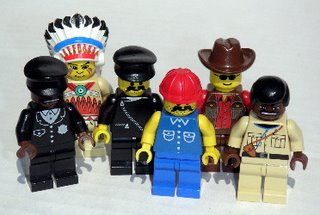LEGO Attacker Hits Brick Wall: TTAB Denies Genericness Petitioner's Motion for Judgment or Other Sanctions
In a 46-page Order, the Board denied Petitioner Zuru LLC's motion for sanctions and for further discovery in this cancellation proceeding based on the alleged genericness of the mark LEGO for toy building blocks. Zuru argued that the requested relief was warranted in view of Respondent Lego’s purported misconduct related to its responses to Zuru’s discovery requests. The Board found neither spoliation nor "discovery fraud," but it pointed out that Lego "was nonetheless not as cooperative as it could have been during the discovery period, which contributed to the delay in this proceeding." Zuru LLC and Zuru Inc. v. Lego Juris A/S, Cancellation No. 92075254 July 24, 2023) [not precedential] (Order by Interlocutory Attorney Elizabeth J. Winter).

Zuru claimed that Lego “made threats [to dictionary publishers] to induce changes to relevant evidence” and sought to “scrub the world of evidence proving that [‘lego’ had become generic]." Furthermore, Lego allegedly failed to timely inform Zuru of its letter-writing campaign, even though the existence of the campaign was “directly responsive to [Petitioners’] discovery requests." Zuru also asserted that Lego had a duty to preserve the dictionary definitions as they existed previously.
Zuru sought entry of judgment against Lego, but the Board found that request premature since Lego had not defied a Board Order relating to discovery, nor had it filed numerous frivolous motions, failed to meet and confer with Petitioners, taxed Board resources, or submitted fabricated evidence.
As an alternative, Zuru requested sanctions in the nature of the entry of certain evidentiary presumptions against Lego and the striking of any expert opinion offered by Lego‘s expert witness. It based this request primarily on the claim that Lego engaged in spoliation of evidence, and in "discovery fraud" by hiding the dictionary letters from Zuru and from Lego’s own expert witness.
The Board, however, found nothing wrong in Lego writing to dictionaries asking them to alter their on-line definitions of the term “Lego.”
As a general matter, a trademark owner is not only entitled to police others’ use of its registered mark, but its failure to prevent widespread improper, generic use of its mark may subject the trademark owner to a determination that it has abandoned its mark.
As for alleged spoliation based on Lego's failure to preserve copies of the dictionaries’ previous definitions of “Lego," the Board was equally unimpressed. It noted that "as a threshold matter, to sanction a party for destroying or altering evidence held and altered by a third party, the party alleging spoliation must show that its adverse party had a duty, i.e., the ability, to preserve or alter the evidence." The Board concluded that Lego had no duty to preserve the dictionary definitions.
As for "discovery fraud," the Board reviewed Lego's litigation conduct in detail, considering particularly whether Lego failed to timely disclose or supplement its discovery production with its 13 letters to dictionary publishers and whether it misled Zuru regarding whether Lego had already produced all documents relating to its efforts to prevent generic use or misuse of "Lego."
The Board found Lego's discovery responses to be proper in view of its reasonable construction of Zuru's requests. Moreover, Lego provided documentation showing that its late disclosure of the dictionary documents was "unintentional."
Although Respondent did not disclose the evidence of its letter-writing campaign for over one year, delayed disclosure, as in this case, is not equivalent to actively misleading the adverse party as to the non-existence of documents, destroying evidence, making a false representation to the Board, or submitting a false document to the Board, which are generally the types of conduct involved when the Board has made adverse inferences as a sanction.
The Board also found that Zuru was not prejudiced by Lego's actions, and so a sanction was not appropriate.
Respondent effectively cured the allegedly late disclosure by: (1) supplementing its production of documents in response to Petitioners’ Requests for Production of Documents, albeit late in the discovery period, (2) informing its expert witness, Dr. Finegan, of its dictionary letter-writing campaign, and (3) permitting Petitioners to depose Dr. Finegan again.
Finally, the Board denied Zuru's request that the testimony of Lego's expert be excluded. "It is not the Board’s practice to make prospective or hypothetical evidentiary rulings before trial."
Read comments and post your comment here.
TTABlogger comment: A rather feeble motion, I think.
Text Copyright John L. Welch 2023.




0 Comments:
Post a Comment
<< Home